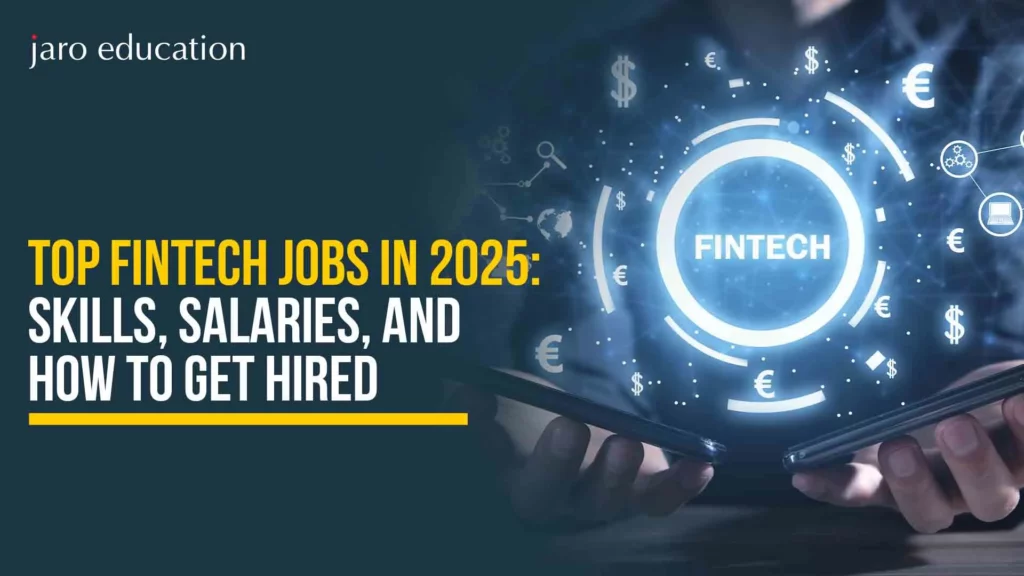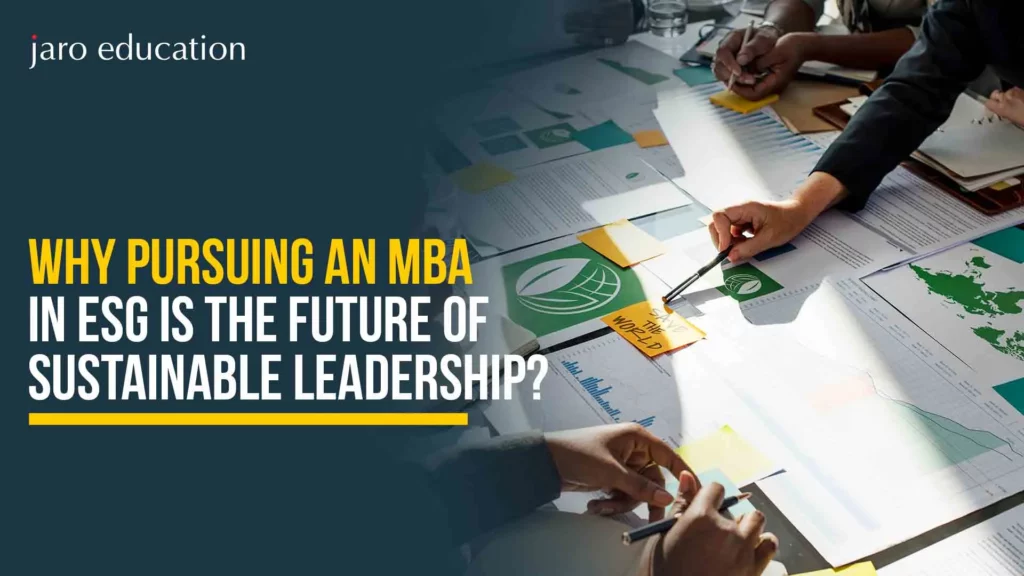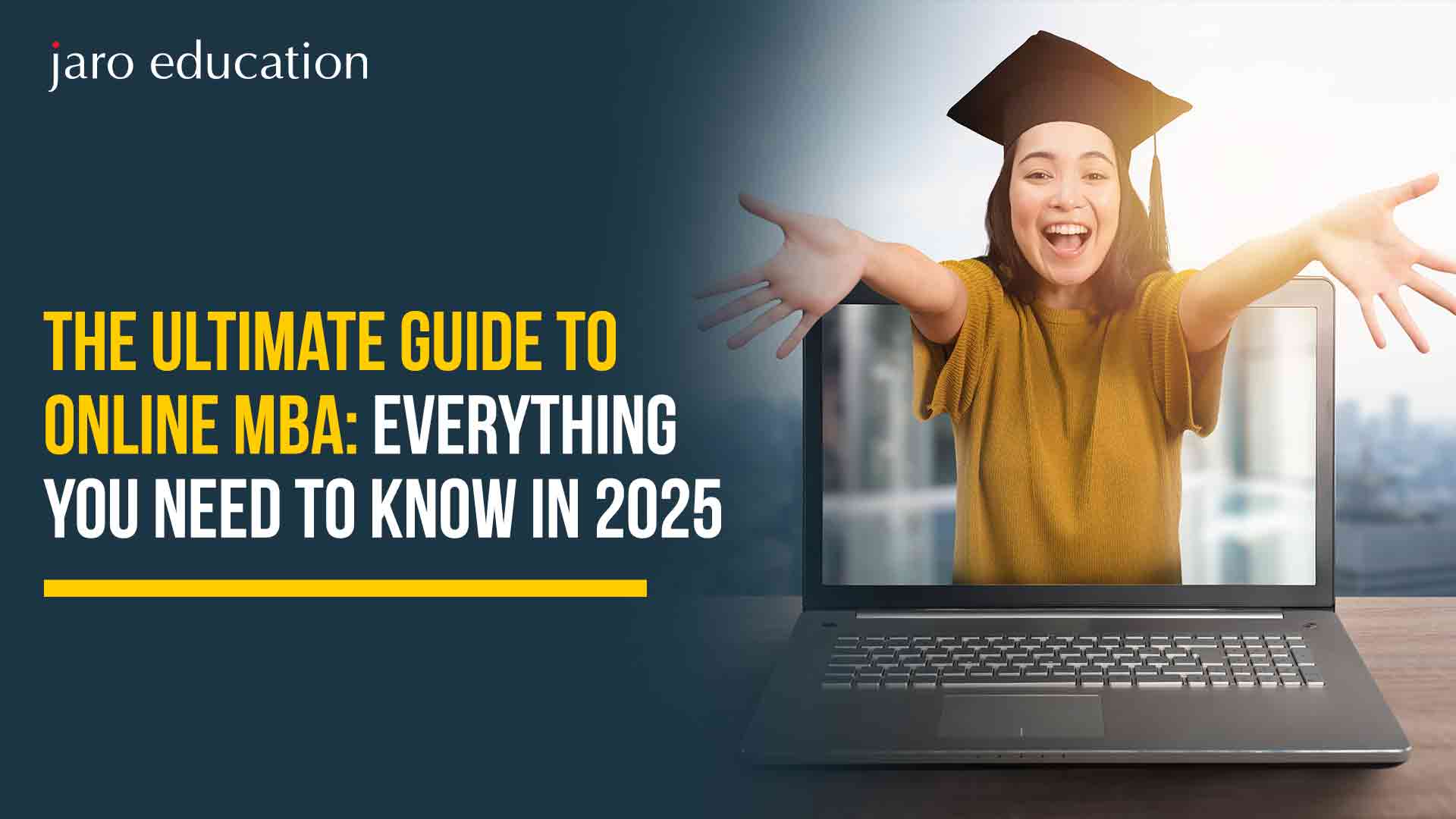Is it worthwhile to pursue an Executive MBA?
Table of Contents
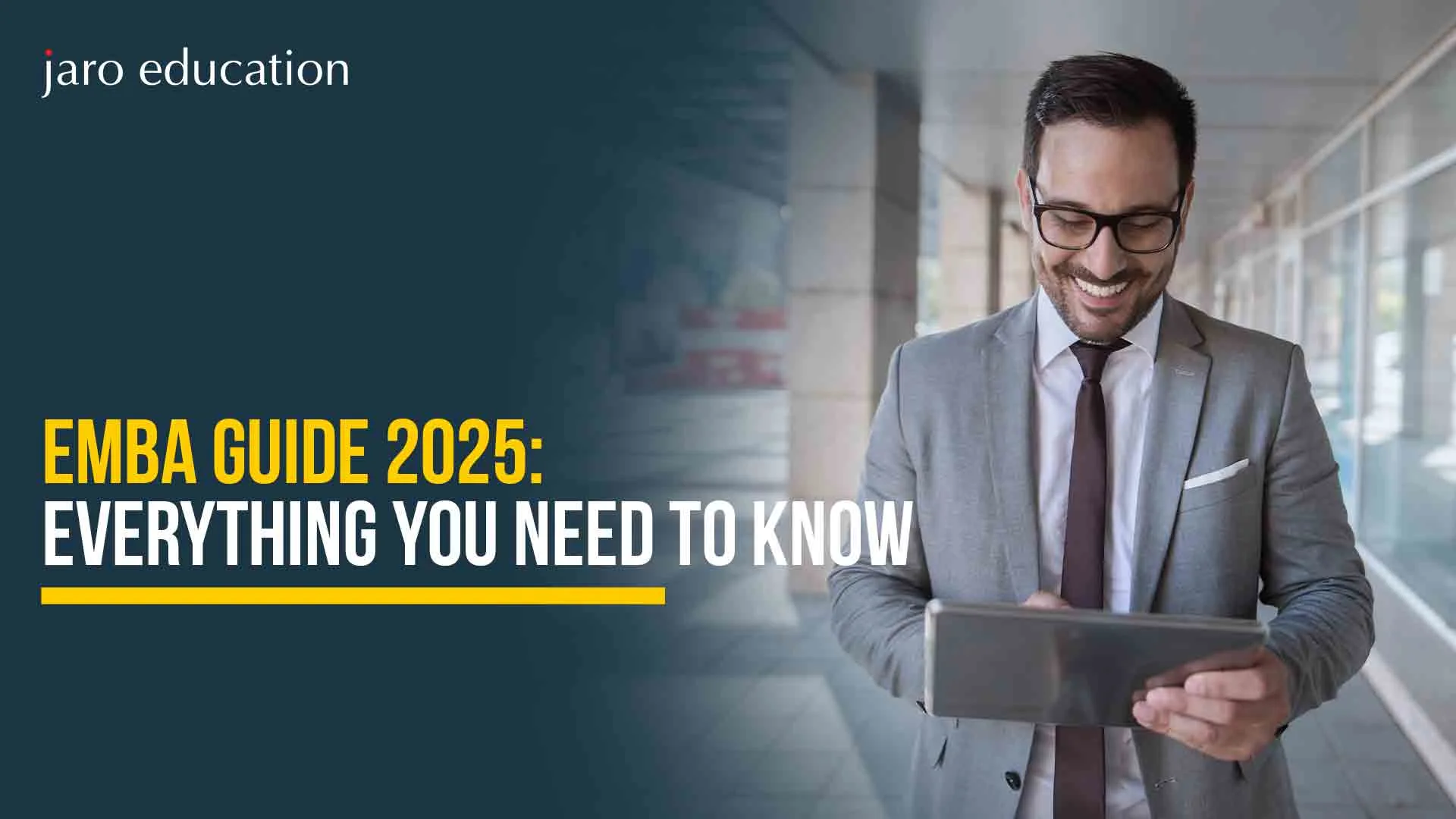
- jaro Education
- 16, October 2024
- 4:00 pm
If you have a few years of work experience and want to advance, the question often comes up: “Will an Executive MBA increase my chances?” Taking on an Executive MBA commitment is a major step. Starting a company requires you to invest your time, effort, and some finances. The positive part is that, for the suitable person, it can help them reach their career objectives.
Nothing reflects the growing complexity of business more vividly than the heavy demand for competent leadership. For mid and senior-level professionals, an Executive MBA in 2025 could be strategic since it develops leadership skills, increases knowledge of specific industries, and provides an opportunity in corporate careers.
In this blog, we will know if Executive MBA is worth it, basic definitions, and the difference between Executive MBA vs MBA
What is an Executive MBA?
An MBA program that is designed for working professionals is an EMBA, or Executive MBA. In an EMBA program, students can be at work and attend classes, which is possible because it accommodates their heavy professional schedules compared to traditional full-time MBA programs. Strategic decision-making, leadership, and executive management are at the centre of the EMBA program and suit the purpose of an individual aiming to take their career to the next level without disrupting their current job.
How to Achieve an EMBA Degree: A Complete Step-by-Step Guide
Thinking it might be a good idea to pursue an Executive MBA (EMBA) to build your career? Great choice! An EMBA is not just a general degree — it’s a helpful tool designed for professionals and mid-career leaders hoping to move up sooner. How precisely does an idea become a realized accomplishment?
Let’s get into the details and talk about it.
1. See if You Meet the Requirements
To begin, please verify your eligibility.
- A bachelor’s degree (in any major)
- You generally need 3–5 years of relevant work experience (requirements vary among institutions).
- Some institutions may require you to take entrance exams (such as GMAT, GRE, or their tests).
- A successful career or previous experience as a manager is often looked for.
- Top B-schools could skip entrance exams for you if you have enough experience in the business field.
2. Look into the Different EMBA Programs
Different EMBA programs have different qualities. Some programs develop leaders, others explore international business, and some address digital innovation.
These are the main things you should be looking out for:
- A school recognized by AICTE, UGC, or a similar association abroad (like AMBA, AACSB)
- Department specializations (Finance, HR, Marketing, Strategy, etc. A hybrid or Online Format can help if flexibility is something you need.
- Uniting with different industries or working with a global community
- A developed network of former students and help with placements
3. Apply for Admission
Application time! Normally, an EMBA application covers:
- Updated resume/CV
- Explain your reason for pursuing the Executive MBA.
- Official records called academic transcripts
- Letters of recommendation sent to the scholarship board by employers or mentors
- Test scores received at the time of application (if applicable)
- Tell the truth in your SOP rather than focus on fancy or trendy words.
The Main Benefits of an Executive MBA (EMBA)
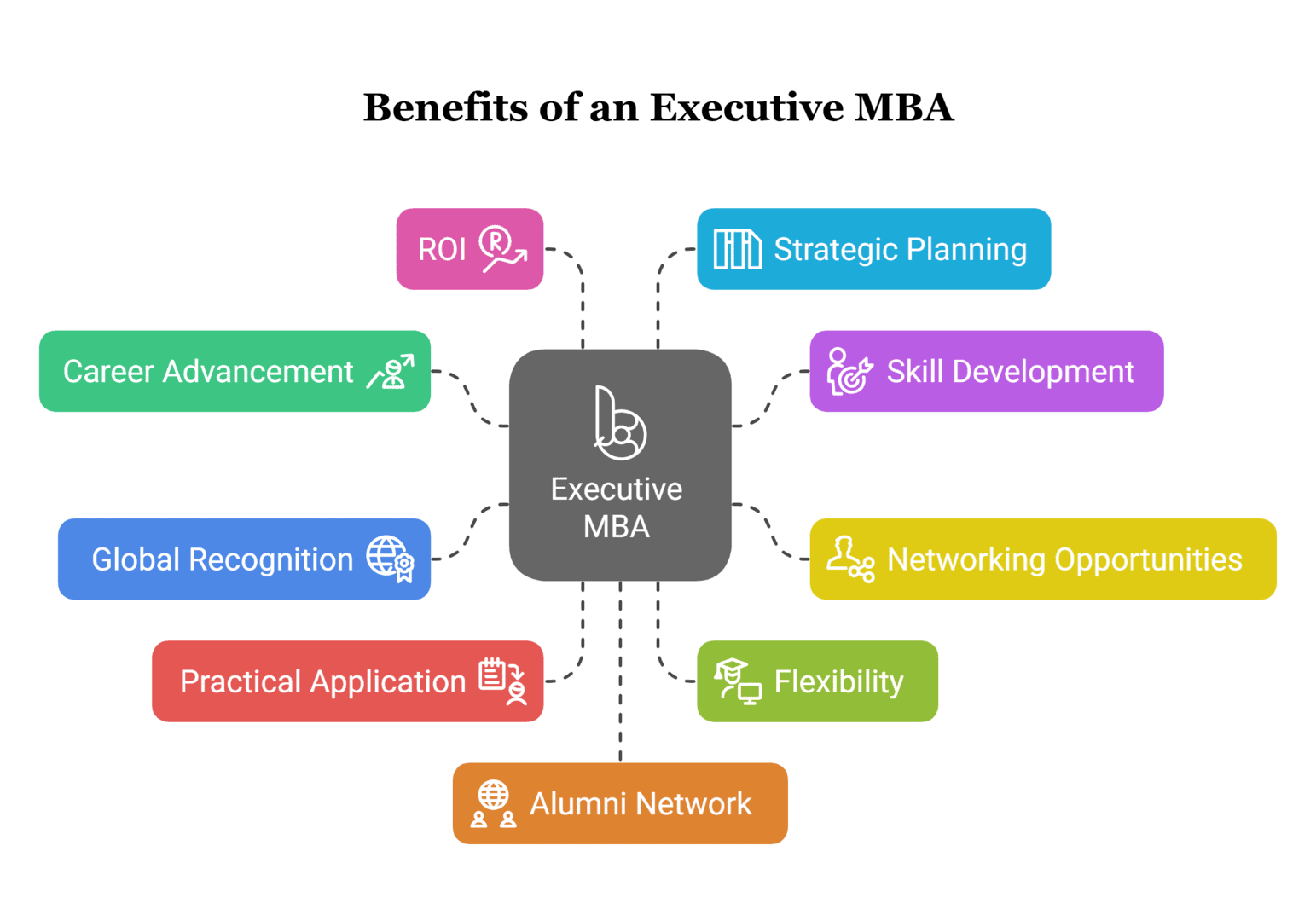
- Move Up Your Career Ladder Without Taking a Career Break
Because weekend or evening classes are offered, the EMBA enables you to learn and advance without interrupting your career or salary.
- Promotions and higher salaries started happening early on.
Within 1–2 years after finishing their EMBA, graduates typically rise in their careers, reach leadership positions, and make higher incomes.
- Developing leadership skills and executive management ability
Unlike regular MBAs, EMBAs help you develop strategic thinking, leadership skills, knowledge of global business, and the ability to make important decisions, which is important for reaching the highest positions in a company.
- Strong Connections with Other Students
Your classmates are managers or directors who have worked in a range of industries. Because of this, getting involved helps people find peers to work with, mentors, and job openings.
- Respected Around the World by Top Educational Institutes
A lot of EMBA programs are offered by top organizations like IIMs, IS, B, and international B-schools. The degree is valued globally and helps people open doors in many places.
- Hands-on and practical-focused lessons
EMBA students can apply new information immediately through exercises, business scenarios, and a final project, which helps them solve real-life problems.
- Allows Working Professionals Flexibility
You can study EMBA on weekends, hybrid mode, or online, which ensures you maintain high standards with your time.
- Returns on Investment (ROI) are high.
Even with a higher cost, the EMBA can pay off faster through its benefits of faster advancement, a well-respected position, and recognized professional achievements.
- Clearer Plan for the Future and Better Decisions
EMBA teaches you to look beyond your usual tasks. You will gain skills to lead growth for the organization by using strategies, being innovative, and leading teams.
- School Alumni and Professional Opportunities
Several EMBA courses provide chances to join global networks, get referred for jobs by alumni, and take part in industry events.
What is the Difference Between MBA and Executive MBA?
The answer is Executive MBA is worth it will be clear by comparing the EMBA vs MBA. An MBA is a significant investment in professional development. You will primarily find two types of MBA: the traditional MBA and the Executive MBA. Let’s find out what the difference is between EMBA vs MBA.
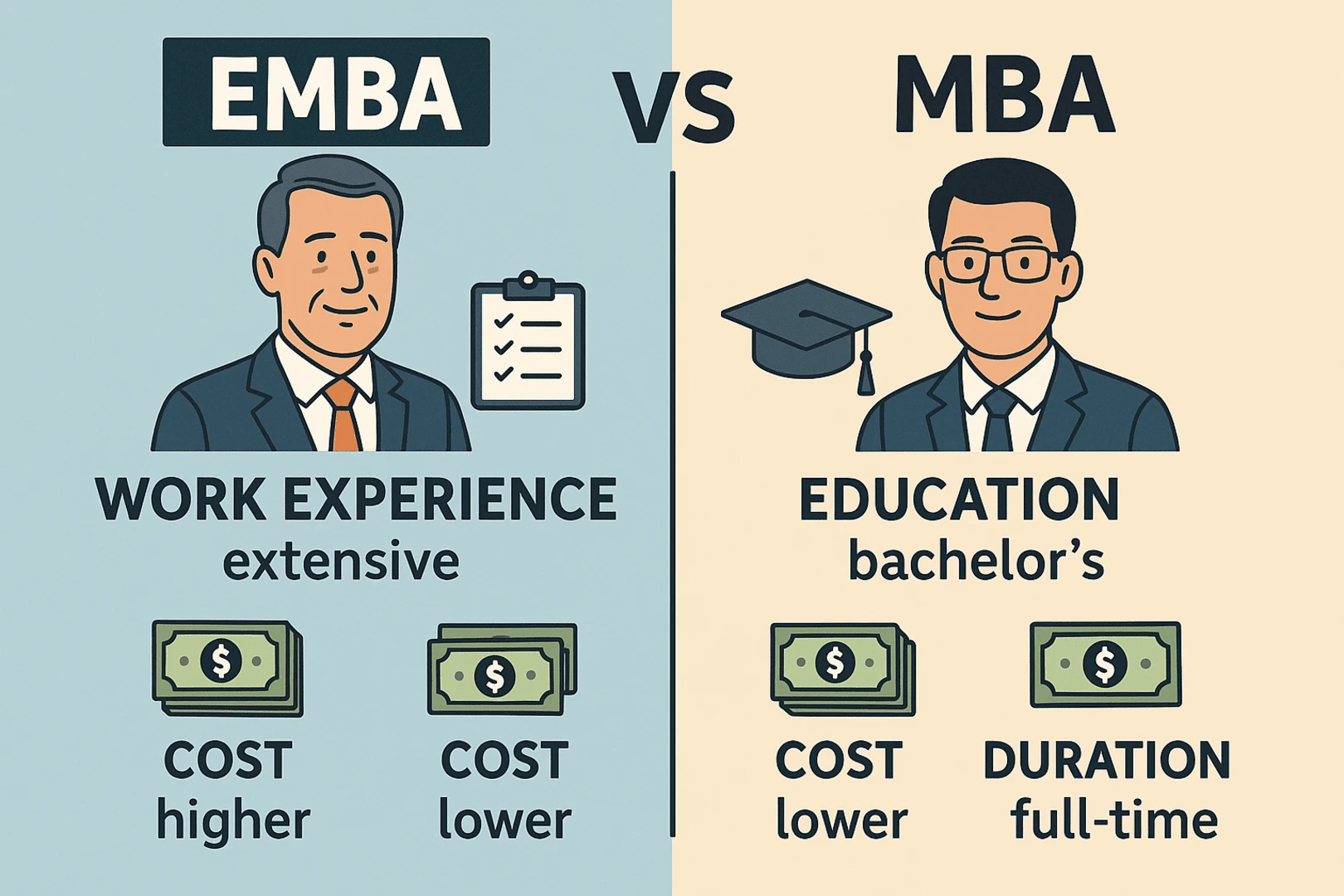
| Feature / Criteria | MBA (Master of Business Administration) | Executive MBA (EMBA) |
|---|---|---|
| Target Audience | Fresh graduates or early-career professionals | Mid-to-senior level professionals with work experience |
| Work Experience Required | 0–3 years (varies by program) | Typically 5–10+ years |
| Program Duration | 1–2 years (full-time or part-time) | 1–2 years (mostly part-time or modular) |
| Class Schedule | Regular weekday classes | Weekend or evening classes; flexible scheduling |
| Learning Focus | Foundational business knowledge | Strategic, leadership, and real-world business application |
| Peer Group | Students from various academic backgrounds | Experienced professionals and managers |
| Program Rigor | Intense academic coursework | Practical, executive-level learning |
| Cost | Lower to moderate (₹5L – ₹25L approx. in India) | Higher (₹10L – ₹40L+ depending on institute) |
| ROI and Career Goals | Entry-level to mid-level jobs; career foundation | Senior roles, leadership, entrepreneurship, and global roles |
| Admission Requirements | Entrance exams like CAT, GMAT, MAT, XAT, etc. | Work experience, profile review, sometimes GMAT or in-house test |
| Best For | Those looking to start or switch careers in business | Professionals looking to advance or pivot their careers |
Profile of the Student
-Prefer a full-time graduate school experience. This is especially suitable for fresh graduates and young professionals trying to advance in their career paths or switch careers.
-MBA students tend to have fewer years of working experience than those pursuing an EMBA program.
-E” for “Executive, but you don’t have to be an executive to apply.
-The average EMBA candidate is a mid-to-senior-level manager with lots of work experience.
-Many EMBA vs MBA applicants also have other graduate degrees in such fields as law (JD), medicine (MD), or a master’s degree in an area of specialisation.
Difference in Curriculum
-A traditional MBA program covers advanced business fundamentals, and master ”’ s-level learning incorporates the classroom with practical and experiential learning, such as internships and group projects.
-Elective coursework allows for customisation of the degree toward a desired career path.
-Such a program would be ideal for professionals needing in-depth exposure to business concepts at the start of a career.
-EMBA vs MBA focuses on leadership and strategic thinking taught by experienced professionals, so what you learn may be applied to real-time circumstances in your job.
-Moreover, the curriculum is designed to improve or refine your executive presence, offering strong networks, personalised career coaching, and access to industry experts.
Duration
-The majority of MBA courses are a full-time, two-year residential experience. However, there are a variety of one-year accelerated MBAs, depending on the stream or requirements for the students.
-In general, individuals have to take a sabbatical from their jobs and apply to studies, with most schools providing full support with internships and jobs.
-EMBA programs are work-friendly, meaning they are taken part-time over weekends. Such programs can last from 17 months to 22 months.
-Furthermore, they enable candidates to work on a job while studying, and comfort in balancing professional and academic engagements is possible. Some EMBA vs MBA programs also have residential sessions for professionals to get close to one another and become involved in learning activities that feel less disruptive at work
Cost
-For MBA programs in IIMs, the fee structure varies from ₹11.75 lakh to Rs 32 lakh; however, newer IIMs offer lower fee structures, with some even offering structures under Rs. 16 lakh for MBA under CAT.
-Furthermore, there are scholarships and financial aid that are offered by various companies and business schools for students
-Executive MBA costs between ₹20 lakhs to ₹27 lakhs. It is worth noting that most EMBA applicants secure full or partial sponsorship from their employers.
-There is also financial support for these programs in the form of scholarships and other forms of aid.
Is an executive MBA worth it in 2025?
Looking forward to 2025, the value of an Executive MBA remains high for the following reasons:
Career Development
An EMBA can often be a very powerful tool for career advancement in an extremely competitive job market. The students of EMBA programs are much better placed in their organisations for more senior management roles as they attain advanced knowledge and skills. Most organisations actively look out for these graduates for leadership positions because these graduates have tons of experience supplemented by the best current business needs.
Networking Opportunities
The EMBA program’s massive privilege lies in networking opportunities. The participants come into contact with fellow executives from different fields, linking them to potential collaborators or future employers. The diverse nature of those in each cohort makes their discussions and learning experiences so diverse and full of insights that participants will gain.
Personal Development
Pursuing an EMBA has far-reaching benefits beyond professional advantages. It helps develop personal skills, challenging the participants intellectually and encouraging them to develop critical thinking skills essential for leadership.
Global-View
Many EMBA programs now offer international modules or partnerships with globally oriented institutions. The participants are then exposed to international business practices and cultures. The global dimension is becoming increasingly important in a world where businesses operate in highly interconnected markets.
Employer Sponsorship
An EMBA has recognition from many organisations, so they try to sponsor or partly fund this degree for the employees. This also shows the efforts put into developing a company’s leadership talent and relieving them from their financial burdens.
Executive MBA at Dayananda Sagar University: Accelerate Your Career Growth
The dynamic business world of today demands for an individual to upskill and stay relevant at every step of their career. There is a dire need of postsecondary education to build a workforce of the highest quality. The 17 Months, E-MBA by Dayananda Sagar University is the key to a sustainable career development in the field of management. The program is designed specifically to suit the working professionals with flexible online classes and alternate weekend on-campus sessions which can be availed from remote locations too, helping them scale up in their corporate roles at their convenience.
Program highlights:
- Accelerated, Interactive, Self-Paced Learning
- Guidance from Industry Leaders and Subject Experts
- Contemporary and Progressive Curriculum
- Capstone Project
- Flexible Online Classes (Recorded Lectures Through LMS) campus
- Immersive On-Campus Classes
Jaro Education: Your Trusted Partner in Career Counseling and Growth
Jaro Education treats career progress as a process that individuals experience, rather than merely as a final achievement. With expert guidance, personalized counseling, and access to organized, industry-driven programs, Jaro helps students and career professionals think wisely about their careers. Jaro Education supports you at every stage, assisting you in advancing your skills, switching to a new path, or accelerating your career growth.
Jaro Education successfully completes degree courses for 80.54% of its students, and even higher for certification courses, demonstrating our commitment to quality and learner satisfaction. Approximately 29,000 individuals have undergone career changes and upskilling through Jaro’s training, illustrating how we make significant improvements possible.
Frequently Asked Questions
A: An Executive MBA (EMBA) is a postgraduate degree in business management designed specifically for working professionals with significant experience. Unlike a regular MBA, EMBA programs offer flexible schedules like weekend or online classes to accommodate work commitments.
A: EMBA is ideal for mid-to-senior-level professionals, entrepreneurs, or managers who want to enhance their leadership, strategy, and decision-making skills without leaving their job.
A: Typically, candidates need:
A bachelor’s degree in any stream
Minimum 3–10 years of professional experience (depending on the institution)
Some universities may require GMAT/GRE or in-house admission tests
A: EMBA is tailored for experienced professionals with classes during weekends or evenings. A regular MBA is full-time and suited for fresh graduates or those early in their careers.
A: Most EMBA programs last 12 to 24 months, depending on the institute and study format (full-time, part-time, hybrid, or online).

